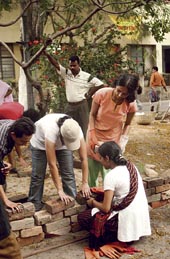 |
It took the government two years to draft a policy for the youth, which it announced grandly at a posh hotel in Ranchi on July 30. The draft, prepared after consultations with the block-level to state-level officials, is a classic 18-page document that gave one little clue about what the state’s policy for its youth is all about. The people one spoke to, had their own ideas about what a state policy for its youth should be like.
Jagdish Rao, an academician and director of a coaching centre for commerce in Dhanbad, feels that the youth today need to be guided towards exploring the cultural and natural resources of the state. Jharkhand has a rich treasure of forests and the tribals possess a rich knowledge of how to use natural resources to treat diseases.
If the state government as a “youth policy” makes it compulsory in all higher education institutions to explore the forest products then it could be beneficial for the entire state, not just the youth, he points out. Their research work can be further worked upon by interested drug industries and the government, is what Rao feels.
Sujata Ranjan Mukherjee, an English teacher of Delhi Public School (DPS), Dhanbad, says that the “literacy of underprivileged” mentioned in a section of the courses for senior classes seems to be only in books. If “educating the underprivileged” becomes a “youth policy” for the students from Class IX onwards, there would not be need for literacy campaigns. Sujata also feels that marks should be allotted for the project, so that students take it seriously.
This will not only fulfil the idea of “each one teach one” mentioned in the books, but also eradicate illiteracy to an extent. Students divided into groups should be allotted a village each to work upon, is Sujata’s suggestion.
Parthojit Roy, a BIT, Mesra, pass out now working with a private sector insurance company, emphasised on the need to teach the youth tribal languages. “At the school-level there should be arrangements for students to learn tribal and the regional languages,” he said, adding that it should not, however, be mandatory and should be left to the discretion of the youth.“Without development of the tribals, we cannot expect a better future for the state,” is his explanation.
Sunil Baraik, pursuing his research work at Ranchi University’s tribal and regional languages department, too, stresses that the youth policy of the state must take into consideration 32 types of scheduled tribe population in the state. “Tribal youths are particularly fit for sports, jobs in police and creative activities. But they are a marginalised lot when it comes to reaping the benefits. The youth policy should focus on developing, substantially, the tribal population, which constitutes about one-third of the local population,” said Baraik.
Surendra Mohan, a polytechnic student in Ranchi, stressed the need to develop industries in the state and students be given the experience of vocational training in such industries. Rakesh Kiran, RU convenor of Ajsu (All Jharkhand Students’ Union), had an interesting observation to make on the issue when he said that the government should first ensure that the youth be decision makers themselves.
“But the universities of the state have failed to conduct student union polls since the past three decades,” he pointed out. Kiran complained that several student bodies were not taken into confidence while forming the “policies for them”.
Srinivas Naidu, final-year mass communication student at Karim City College, Jamshedpur, rued that the university-level youth festival, which was held in 2005, was discontinued in 2006. He feels there’s a need to hold such events regularly and a minimum of five programmes held across the entire state, involving all constituent and affiliated colleges.
While Rajesh Kumar who passed out of college this year and is now working with Usha Martin Limited in Jamshedpur, wants the youth to be involved with projects in the health sector, especially in the rural areas where few health facilities are available, Vishwajeet Kumar Sinha, a trainee with Usha Martin Limited, would like to draw a policy on the proper channelisation of the youth right after matriculation. He feels too much time is lost pursuing general courses which do not lead anywhere and give one no practical experience.










